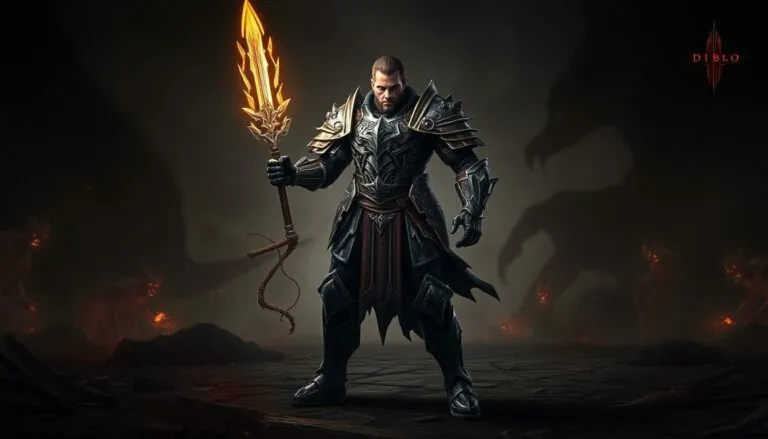Table of Contents
ToggleIn the dark and twisted world of Diablo 4, understanding your character’s stats isn’t just a luxury—it’s a necessity. Imagine wandering through Sanctuary, only to realize your strength is as effective as a butter knife against a demon horde. Stats are the backbone of gameplay, shaping every encounter and decision.
Overview of Diablo 4 Stats
Diablo 4 features a variety of stats that significantly affect gameplay. Strength, Dexterity, Intelligence, and Willpower serve as core attributes influencing character performance. Each stat directly impacts specific skills and abilities, demanding players to invest wisely based on their chosen class.
Strength enhances physical damage output and improves armor ratings, making characters more resilient in combat. Dexterity increases critical hit chance and boosts the effectiveness of ranged weapons. Intelligence amplifies damage for spells, enhancing the potency of magic-based characters. Willpower, a lesser-known stat, influences resource generation and improves survivability during intense battles.
Player decisions regarding stats influence gameplay style. A balanced approach might suit some, while others may prioritize offense or defense based on personal strategies. Understanding the nuances of each stat allows players to tailor their characters to meet specific challenges.
Adopting an informed approach to character stats shows its benefits during gameplay. Investing in the right stats leads to effective encounters and smoother progress through Diablo’s treacherous world. Players who neglect this aspect may find themselves ill-equipped, struggling against formidable foes.
Stat allocation requires careful consideration. Characters using heavy armor might prioritize Strength for better damage reduction, while casters focus on Intelligence to maximize their spell efficacy. As upward progression occurs, adjusting and fine-tuning stats becomes essential to tackle the evolving difficulties in the game.
Primary Stats in Diablo 4
Understanding primary stats in Diablo 4 enhances gameplay. Each stat influences different aspects of character abilities and performance.
Strength
Strength significantly boosts physical damage and defenses. This stat plays a crucial role for classes that rely on melee attacks. Players with high Strength deal more damage with physical skills. Armor ratings also improve, making characters more resilient against attacks. Prioritizing this stat benefits tanky builds aiming to absorb hits while dealing damage.
Dexterity
Dexterity increases critical hit chances, especially for ranged weapons. It contributes to hitting enemies harder when using bows or crossbows. Enhanced dodge capacity allows characters to evade incoming attacks more effectively. Higher Dexterity not only makes players deadlier but also more agile in combat. Focusing on this stat is ideal for players wanting to maximize damage output while maintaining mobility.
Intelligence
Intelligence amplifies spell damage and effectiveness for magic users. Characters that specialize in casting will find this stat invaluable for high-damage spells. Increased mana pool provides more resources for casting abilities, improving overall combat sustainability. Players who invest in Intelligence typically unleash devastating spells on foes. Prioritizing this stat leads to powerful offensive magic gameplay.
Willpower
Willpower influences resource generation and survivability. This stat enhances abilities that restore energy, allowing for more frequent skill use. Characters with high Willpower can sustain themselves in prolonged battles. It also boosts survivability through damage reduction or healing effects. Investing in Willpower supports a balanced playstyle where resource management becomes a key tactic.
Secondary Stats and Their Importance
Understanding secondary stats significantly affects gameplay. Players should prioritize armor ratings, critical hit chances, and damage reduction for optimal performance.
Armor Rating
Armor rating directly influences how much damage a character can absorb during combat. Higher armor ratings result in reduced damage taken, allowing players to withstand tougher enemies. Melee-focused characters benefit from enhanced armor since they often engage enemies up close. Investing in armor rating can provide a solid defense, especially for tanks. Players can find armor upgrades through gear, skills, and stat investments. Enhanced armor allows characters to explore more challenging areas with confidence.
Critical Hit Chance
Critical hit chance plays a crucial role in maximizing damage output. This stat increases the likelihood of landing critical hits, which deal amplified damage to targets. Ranged characters, in particular, should focus on raising this stat to take advantage of powerful attacks. Classes that rely heavily on critical damage can rapidly eliminate foes when equipped with the right gear. Calculating critical hit chance becomes vital, as even a slight increase can tip the scales in difficult encounters. Every point invested can translate into significant combat advantages.
Damage Reduction
Damage reduction is essential for minimizing incoming damage from attacks. This stat is typically influenced by armor rating and other game mechanics, forming a safety net during intense battles. Players should consider gear and skills that provide additional damage reduction effects. Classes that face tougher enemies require heightened damage reduction to survive longer. As players progress, strategizing damage reduction becomes increasingly critical, especially in endgame scenarios. Effective management of this stat provides substantial benefits, enabling smoother gameplay through various challenges.
How Stats Impact Gameplay
Understanding character stats significantly influences gameplay in Diablo 4. Strength, for instance, boosts physical damage and armor ratings, essential for melee characters. Case in point, a Barbarian benefits from high Strength, allowing for greater damage output and staying power against enemies.
Dexterity, on the other hand, improves critical hit chance and agility for ranged classes. A Rogue thrives with elevated Dexterity, enhancing evasion and maximizing damage potential with each shot. Primary stats like these require careful consideration based on the player’s chosen class and playstyle.
Intelligence amplifies magical abilities, increasing spell damage and expanding the mana pool for casters. Sorcerers leverage this stat for powerful offensive strategies. Meanwhile, Willpower plays a vital role in resource generation and overall survivability, underlining balanced builds.
Making informed choices about stat allocation shapes unique gameplay styles. Some players favor a balanced approach for versatility, while others may prioritize offense or defense for specific challenges. Neglecting stats leads to vulnerability during encounters.
Secondary stats, such as armor ratings, critical hit chances, and damage reduction also contribute to effectiveness in battle. Armor ratings directly affect damage absorption, allowing characters to endure tougher fights. Critical hit chances add a layer of strategy, providing significant advantages during crucial moments.
Survival hinges on effective management of these secondary stats as players progress. Navigating endgame challenges requires attention to detail, ensuring optimal performance and smooth gameplay through carefully balanced attributes.
Tips for Optimizing Your Character’s Stats
Players optimize their character stats by focusing on their chosen class’s strengths. For melee classes like Barbarians, prioritizing Strength enhances physical damage and armor ratings. This increase allows them to endure tougher battles effectively. Ranged characters, such as Rogues, benefit from maximizing Dexterity, which improves critical hit chance and agility. By doing so, they can effectively evade attacks while dealing consistent damage.
Allocating points to Intelligence is crucial for spellcasting classes. This stat amplifies spell damage and increases mana pool size, enabling better spellcasting versatility. Willpower plays a vital role in managing resources and survivability, particularly for balanced builds. Players can adjust their stats to suit their gameplay style by investing in this attribute.
Secondary stats deserve attention as well. Armor ratings impact damage absorption significantly, which is essential for melee-focused characters facing overwhelming foes. Increasing the critical hit chance is instrumental for maximizing damage output, especially in ranged combat. Small boosts here can vastly improve combat effectiveness.
Damage reduction greatly influences survivability in intense situations. Characters with higher damage reduction can withstand harsher encounters, enhancing their chances of victory. Managing these secondary stats throughout gameplay becomes critical, especially in the endgame stages.
Players should revisit and adjust their stats regularly. As they progress through Diablo 4, they encounter evolving challenges that demand strategic stat allocations. A thoughtful approach to both primary and secondary stats can lead to more effective encounters and improved gameplay experiences.
Conclusion
Mastering character stats in Diablo 4 is vital for any player looking to thrive in the game. By understanding how Strength, Dexterity, Intelligence, and Willpower impact gameplay, players can make informed decisions that enhance their effectiveness in combat.
Balancing primary and secondary stats not only shapes individual playstyles but also prepares players for the challenges they’ll face as they progress. Regularly revisiting stat allocations and focusing on class strengths ensures a strategic approach to encounters.
Ultimately, the right stat management leads to smoother gameplay and a more rewarding experience as players navigate the dark world of Sanctuary.






